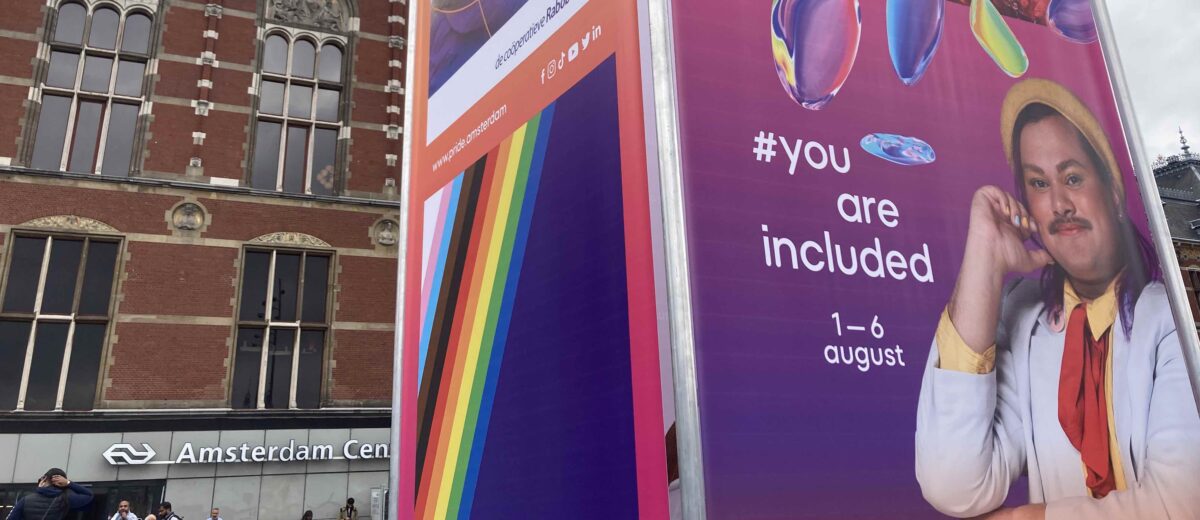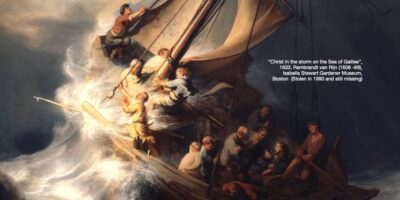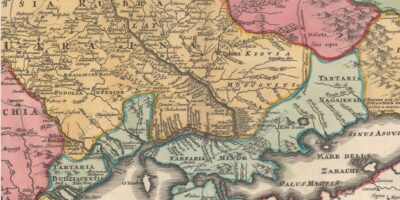Winding its way through the streets of ‘the most liberal city in the world’, the rainbow-bedecked tram spreads its message in big letters along the roofline: ‘You are included’.
Celebrating two weeks of street parades, canal processions, park festivities, concerts, dinners and open air cinemas, Queer and Pride Amsterdam 2023 this year is going to extra lengths to ‘normalise’ that which until recently was widely considered, well, ‘queer’.
Similes for that word listed in my thesaurus include: odd, strange, unusual, peculiar, curious, bizarre, weird, outlandish, eccentric, unconventional, unorthodox, unfamiliar, abnormal, anomalous, atypical, untypical, offbeat, deviant, aberrant, freakish; suspicious, dubious, questionable; eerie and unnatural.
Almost nothing can be excluded, it seems. The abnormal is now normal. The acronym used these days to group sexual orientations and gender identities is a growing string of letters, such as LGTBQIA2S+. These stand for Lesbian, Gay, Bisexual, Transgender, Queer and/or Questioning, Intersex, Asexual, Two-Spirit, and ‘the countless affirmative ways in which people choose to self-identify’. Internet sources tell us: ‘these definitions are widely, but not universally, accepted. An individual’s self-definition always takes precedence over any dictionary definition. So, for example, a woman who says she is a lesbian but has dated men is a lesbian. A bisexual who has only ever dated people of one gender is still a bisexual. The most important thing about definitions is that people define their own identities for themselves.’
We are also informed: ‘The LGBTQIA2S+ acronym is not complete (that’s what the ‘+’ indicates), and it’s not perfect. The choices about which identities get a letter in the acronym are always challenging, and there are many identities that are not explicitly included in the acronym and are still entirely valid.’
Long process
Welcome to our ‘strange, new world’, to use the title of a recent book by Carl Trueman, a world in which our primary identities are defined by our sexual preferences – for the first time in human history.
Inclusivity sounds wonderfully accepting. Who would dare question its validity? Yet you can be excused for feeling a little disorientated. Even within the non-straight ‘community’, contradictions are creating confusion and conflict. Unlike lesbians and gays, for example, transgenders do not accept fixed genders. So if a lesbian chooses to become transgender, where does that leave her/his/their partner? Feminists too accuse transgenders of undermining the status of being a woman and the whole campaign for women’s rights. Unbounded inclusion risks polarisation.
Behind this apparently sudden and recent shift of values and self-perception in western society is a long process Trueman traces back to Descartes and Rousseau, through to Marx, Nietzsche, Darwin and Freud. The process starts with the rejection of God and of any revealed design or purpose for human life.
Those unable to keep up with the fast-changing times, and still old-fashioned enough to believe that human dignity and identity are rooted in the idea that all humans are created in the image of God, will find themselves targeted as bigots blocking the path to authenticity, the freedom to choose our own identity based on our current sexual preference. Opposing personal happiness, such dogmatists will be seen as the new oppressors, the new racists. Tolerance is now obsolete. Affirmation is demanded. Religious freedom is becoming a threat to social cohesion and thus distasteful, disturbing and undesirable.
Global boiling
Add to this titanic shift the cataclysmic evidence of climate change. ‘The era of global boiling has arrived’, declared the UN general secretary this week. Responding to fires from superhot Portugal and Greece, unprecedented heavy rainfalls and flooding, and rapidly melting arctic icecaps, he called for dramatic, immediate climate action: ‘Climate change is here. It is terrifying. And it is just the beginning.’
Where can we find hope in our changing Europe – where the trench warfare of a century ago has surprisingly resurfaced, where resurgent facism challenges shaky democracies, and where authoritarianism and cancel cultures erode freedoms of speech, thought and worship?
For without foundations, liberté, egalité & fraternité can quickly morph into oppression, disparity and hatred, as the events during and following the French Revolution remind us. This month local television asked 50 lecturers and professors and 100 students at the University of Amsterdam to comment on accusations that ‘wokism’ was threatening academic freedom on the campus. Most refused to be interviewed due to fear of being ‘cancelled’ or prevented from graduating – right here in the ‘city of freedom’.
This year’s Summer School of European Studies, starting in Amsterdam in three weeks (Aug 21-24), aims to explore our ‘strange, new Europe’. How we can live in a society increasingly shaped by the rejection of biblical revelation? Daily meditations on Jesus as the ‘still point in a turning world’ will anchor reflections and discussions led by Evert Van de Poll, myself and visiting contributors, supplemented by a city walk, a canal tour and films.
Come and join us in this ‘city of a thousand contradictions’ where we confront the future!

p.s. The Summer School for European Studies costs €250 tuition fees, and €100 accommodation if needed. Scholarships are available for students and non-salaried. To register, or for further information, write directly to info@schumancentre.eu.
Till next week,



